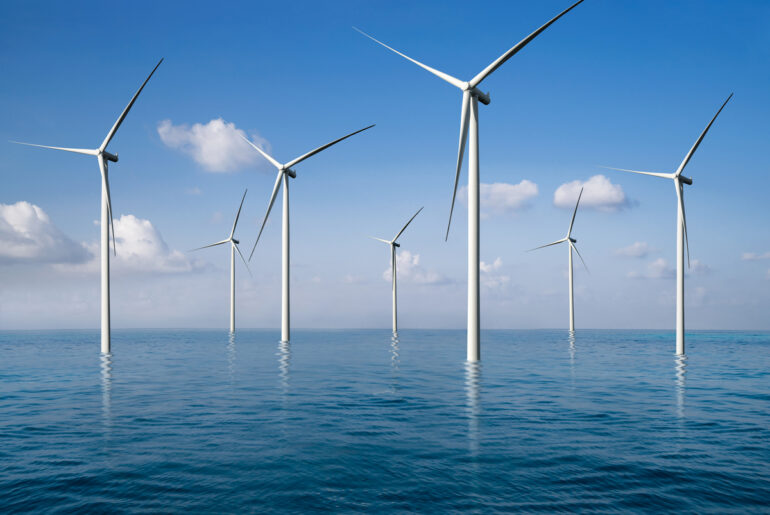Extreme weather. Fresh water shortages. Global warming. The repercussions of climate change are impossible to ignore. For decades, humans have relied on fossil fuels — including coal, crude oil, and natural gas to generate energy and power up our planet. But the ongoing use of these nonrenewable resources are taking their toll on the environment. Fortunately, academic programs like the Master of Science in Offshore Wind Energy Engineering at Tufts University are preparing students to redesign the direction of the planet.
*This article is sponsored by Tufts University
What is offshore wind energy?
The offshore wind industry is gaining traction across the United States as a powerful, alternative energy source. Wind turbines serve as a clean and renewable replacement for fossil fuels, resulting in less air pollution from carbon dioxide emissions. Offshore wind farms harness the high force of wind produced over the ocean. Without the obstructions found on land, like objects or buildings, wind reaches a higher and more consistent speed offshore.
The MS in Offshore Wind Engineering at Tufts University is the first U.S. offshore wind energy graduate program dedicated to structural and geotechnical engineering. The brand new program utilizes prestigious faculty, including the program director, Professor of the Practice Eric Hines, to educate students about engineering policy in addition to providing project management training. Offered through the Department of Civil and Environmental Engineering, students enrolled in the 18-month graduate program develop specializations, including support structure fabrication and installation, transmission infrastructure, ports, and extreme events, among others, to receive a personalized academic experience.
“Tufts University is my undergraduate alma mater, so I have a lot of respect for the quality of education the school provides. I liked that it was a new program in a rapidly-growing U.S. industry, and I appreciated the civil engineering focus, which is unique for graduate wind engineering programs,” said Kelly Smith, a first-year MS student.
Prior to enrolling in Tufts’ Offshore Wind Energy Engineering graduate program, Smith spent eight years working as a water resources engineer and consultant. After careful consideration, she decided to shift her focus and transition to a career in the offshore wind energy industry.
“I wasn’t drawn to a career shift until I started learning more about offshore wind through a client. Although I was working in an environmentally-focused field, my expertise was often being used to help conventional fossil fuel generators renew their permits to operate. I wanted to be immersed in a growing industry focused on utility-scale renewables,” she added.
Sustainable solutions for a changing environment
As a member of the first cohort, Smith feels fortunate to help shape the program in real time. During the 2019-2020 academic year, she used her coursework to make professional connections by actively participating in real-world energy discussions.
“In the fall, I took a project-based course where I worked with three other engineering students to research the challenges the offshore wind industry will face in connecting planned generation capacities to the regional land-based electric grid. It’s an extremely interesting and prescient topic. Our group gelled very well, and we continued our work in the spring semester through a special topics class called Power Systems and Markets.”
Smith and team took advantage of an opportunity to comment publicly on real-world issues that led to networking with professionals in the field.
“At the same time we were conducting our research, the Massachusetts Department of Energy Resources (DOER) was requesting public comment on an independent offshore transmission solicitation. Our team, which expanded to include three Tufts professors and a graduate student from The Fletcher School, submitted two responses to DOER that are on public record. As part of that process, we were able to attend the associated technical conference, and we had the opportunity to speak with and learn from highly qualified industry professionals.”
Smith attributes her exposure to exploring cutting-edge research to the nature of the program.
“The Power Systems and Markets research group has been a very unique and rewarding experience, and I think it is emblematic of the adaptable, multi-disciplinary approach that the Tufts Offshore Wind program is excited to foster.”
Award-winning faculty
Learning from top-notch faculty played a role in Smith’s decision to attend Tufts for graduate school.
“The program director, Dr. Eric Hines, has a great deal of first-hand knowledge from an accomplished career as a structural engineer, which was reassuring to me as someone with work experience and plans to re-enter industry upon graduation,” she explained.
Hines elaborated on how Tufts University became one of the first higher education institutions to develop a graduate program with a focus on offshore wind engineering.
“Our tradition of excellence in real-world scholarship combined with our commitment to active citizenship make Tufts a natural home for this program. Our faculty have been involved in offshore wind since its early days in the U.S. We designed the Wind Technology Testing Center – which is the Massachusetts Clean Energy Center’s wind turbine blade testing facility. We also designed the New Bedford Marine Commerce Terminal — which is the first offshore wind construction port in North America. We work closely with a strong network of industry partners on a number of projects. We work with the state of Massachusetts, with our federal delegations and agencies, and with research institutions world-wide. Tufts University is a hub for collaboration and new ideas.” he said.
When asked how the future of climate change will impact society if human interventions don’t occur, Hines described a frightening scene. However, he noted the upcoming generations of consumers are aware of the issues at hand, and that they possess the power to make a change.
“Without effective, sustainable solutions for global warming, life as we know it will change drastically during this century. Our coastal cities will be underwater from melting polar ice caps, extreme hurricanes and wildfires will become the norm, millions of people will be forced to leave their homes, and there will be major disruptions to our food supply. I am hopeful, however, because young people know this, and they are ready to do something about it. We want to empower them. Renewables have become more affordable than fossil fuels, states across the country have legislated plans to decarbonize by 2050, and we know that a green economy can be a just economy. We have the tools to solve this crisis, and we want to do everything we can to get these tools into the right hands.”
Looking for the right graduate engineering program for you? Visit Peterson’s Graduate School Discovery Center, featuring 10 engineering programs with amazing interdisciplinary opportunities. Learn more about the Master of Science in Offshore Wind Energy Engineering program at Tufts University.



